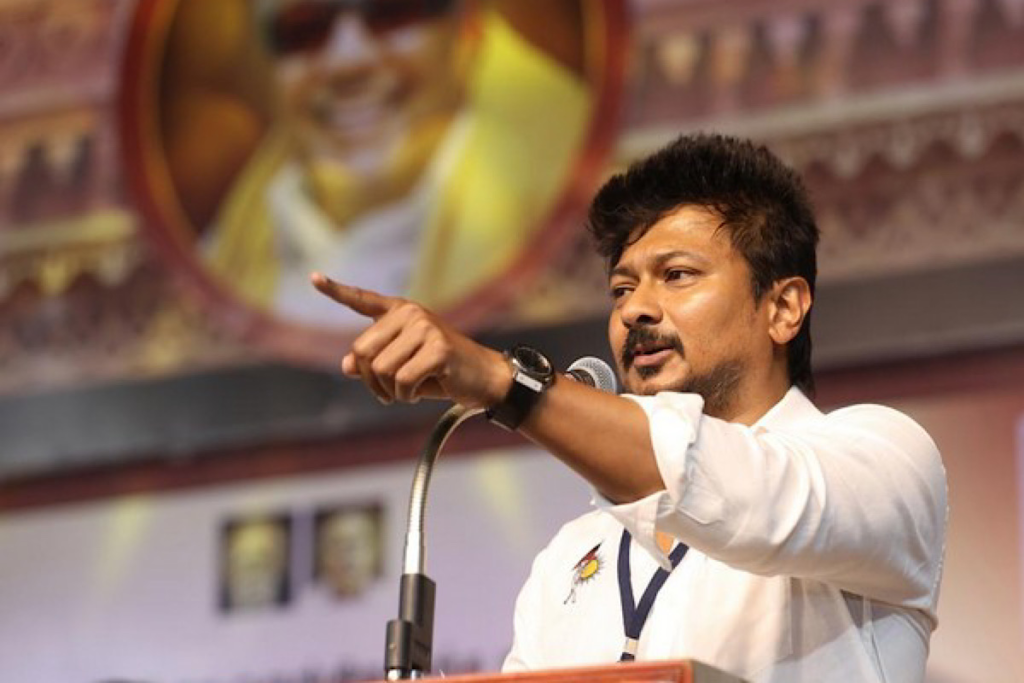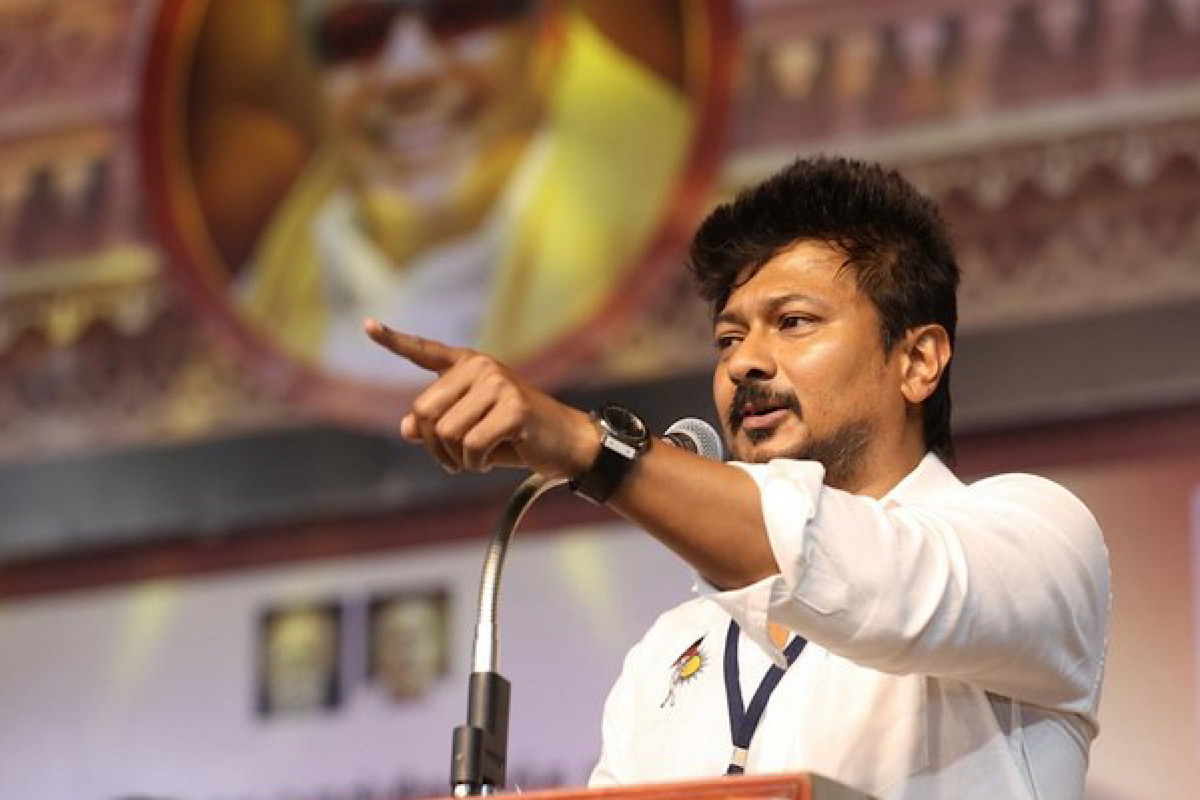
Table of Contents
Udhayanidhi Stalin
The Dravida Munnetra Kazhagam (DMK), one of Tamil Nadu’s most prominent political parties, has long been dominated by the family of M. Karunanidhi, the party’s patriarch. Currently, the party is led by M. K. Stalin, Karunanidhi’s son, who serves as the Chief Minister of Tamil Nadu. Recently, a statement by a DMK minister referring to Udhayanidhi Stalin, M. K. Stalin’s son, as the “Deputy Chief Minister” has sparked significant political debate and speculation about a possible succession plan within the party.
The Context of the Statement
The statement that set off a flurry of political discussions came from DMK minister K. N. Nehru during a public event. He referred to Udhayanidhi Stalin as the “Deputy Chief Minister” while praising his contributions to the party and the government. Although the remark was quickly clarified as a slip of the tongue, it has nonetheless fueled speculation about Udhayanidhi’s rising influence within the party and his potential future role.
Udhayanidhi, who currently serves as the Minister for Youth Welfare and Sports Development, has been gradually assuming a more prominent role in both the party and the state government. His growing visibility and the responsibilities entrusted to him suggest that he is being groomed for a more significant leadership role, possibly as M. K. Stalin’s successor.
Udhayanidhi Stalin: A Political Rise
Udhayanidhi Stalin entered active politics relatively recently, formally joining the DMK in 2019. Prior to his political career, he was better known as a film producer and actor in the Tamil film industry, working on several successful projects. His entry into politics was marked by his appointment as the secretary of the DMK’s youth wing, a position previously held by his father, M. K. Stalin, who used it as a springboard to his current position as party leader.
In the 2021 Tamil Nadu Assembly elections, Udhayanidhi contested and won from the Chepauk-Thiruvallikeni constituency, a DMK stronghold with deep connections to his family. Following his electoral victory, he was inducted into the state cabinet, a move that was seen as an indication of his growing stature within the party.
As the Minister for Youth Welfare and Sports Development, Udhayanidhi has been active in promoting youth-oriented policies and initiatives, further solidifying his image as a dynamic and forward-looking leader. His visibility in both party affairs and government activities has led to widespread speculation that he could be positioned as M. K. Stalin’s successor, continuing the family’s political legacy.
Political Reactions and Speculations
The minister’s inadvertent reference to Udhayanidhi as the “Deputy Chief Minister” has ignited a debate on whether a formal succession plan is already in place within the DMK. Political observers and opposition parties have seized upon the remark, interpreting it as a signal that Udhayanidhi’s elevation to a more significant role within the party and government might be imminent.
Critics argue that the DMK, which has long been accused of promoting dynastic politics, is continuing this trend by potentially positioning Udhayanidhi as the next leader. They contend that such a move would reinforce the perception of the DMK as a family-run enterprise, rather than a party committed to democratic principles and merit-based leadership.
On the other hand, supporters of Udhayanidhi within the DMK argue that his rise is based on merit and his ability to connect with the youth, a crucial demographic for the party’s future. They point to his active involvement in party activities, his successful election campaign, and his performance as a minister as evidence of his leadership capabilities. For them, Udhayanidhi represents a new generation of leadership that can build on the party’s legacy while also addressing contemporary challenges.
The History of Succession in DMK
The DMK has a long history of leadership passing through the Karunanidhi family, making the current discussions about Udhayanidhi’s future all the more significant. M. Karunanidhi, who led the party for over four decades, carefully orchestrated the transition of leadership to his son, M. K. Stalin, ensuring continuity within the party.
Stalin’s rise within the DMK was marked by his gradual assumption of key responsibilities, much like what is currently being observed with Udhayanidhi. Stalin served as the mayor of Chennai, a state minister, and the party’s youth wing leader before eventually becoming the party’s working president and, later, the chief minister. This methodical grooming process suggests that a similar strategy might be in place for Udhayanidhi, ensuring a smooth transition of power.
Implications for Tamil Nadu Politics
The potential elevation of Udhayanidhi Stalin as a key leader within the DMK could have significant implications for Tamil Nadu politics. If he were to be formally recognized as the successor to M. K. Stalin, it would solidify the Karunanidhi family’s hold on the party and likely ensure continuity in the party’s policies and governance style.
However, this move could also galvanize opposition parties, who might intensify their criticism of the DMK’s dynastic politics. The AIADMK, BJP, and other opposition parties could use this narrative to appeal to voters who are disillusioned with the idea of political dynasties, positioning themselves as alternatives that offer merit-based leadership.
Conclusion
The remark by the DMK minister referring to Udhayanidhi Stalin as the “Deputy Chief Minister” may have been a slip of the tongue, but it has nonetheless reignited discussions about the future leadership of the DMK. Udhayanidhi’s gradual rise within the party, his increasing responsibilities, and his growing popularity suggest that he is being groomed for a more prominent role, possibly as the successor to M. K. Stalin.
As the DMK navigates these developments, the implications for Tamil Nadu’s political landscape are significant. The potential elevation of Udhayanidhi Stalin could reinforce the party’s legacy but also open it up to criticism from opponents who argue against dynastic politics. How the DMK manages this transition will be crucial in shaping its future and its appeal to the electorate in the coming years.








